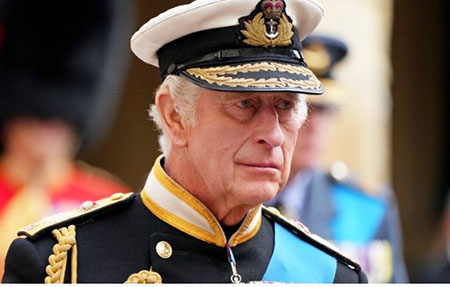Special to WorldTribune.com
 By John J. Metzler, March 7, 2023
By John J. Metzler, March 7, 2023
LONDON — In the anxious countdown to the Coronation of King Charles III, the United Kingdom is shadowed by a raft of economic and political woes ranging from the soaring cost of living to an uneasy nervousness of what’s next in the Ukraine war. Though bracing through the gloomy and cold weather, amid rising food costs, Londoners know spring is coming along with the Coronation May 6th, but what then of facing a turbulent economy and world situation?
Now six months after the passing of Queen Elizabeth II, who reigned for seventy years, most people still feel a lingering grief and sadness but have moved to the stage of acceptance; the Queen is gone, her son is set to be crowned as Charles III.
Britain has weathered many triumphs and challenges during this past year; celebrating the Platinum Jubilee in June, but then a series of cascading government crises where Prime Minister Boris Johnson’s government was swamped by scandals and leadership challenges, culminating in a period of the UK government having three different Conservative prime ministers in a space of two months; Boris Johnson, Liz Truss and now Rishi Sunak.
This kind of churning instability came amid the death of the queen, and the buffeting waves of inflation, the energy crisis and Britain’s deepening role in the Ukraine war.

The high cost of fuel/electricity is partly the result of the government’s inflexible Green Agenda coupled with the knock-on effects of Russian energy sanctions. While the government subsidizes fuel costs even for individual customers, overall energy bills have jumped by 26 percent. Such government subsidies only result in higher spending refueling the inflationary spiral. Britain’s standard of living is slipping.
Still, between 2000-2015 the UK had one of the lowest inflation rates in the world! But now inflation while holding to just over 10 percent, nonetheless has seen a spike of 17 percent in food prices, the biggest jump since 1977.
London’s iconic cab drivers are quick to point out the dramatic costs of the whole green and electric car agenda. Most newer cabs are sturdy Volvo hybrids, yet the day-to-day fuel costs are up by at least a third. Drivers lament that in the wake of the COVID pandemic and current costs, a few thousand drivers have left the business. That’s a real loss in so many ways. Since January 2018, all newly licensed cabs in London must be pricy hybrid or electric models.
And there’s still a post-BREXIT hangover rooted in the 2016 vote leading to the UK formally leaving the European Union (EU) in January 2020, just on the cusp of a devastating pandemic. The narrow victory of Brexit remains a lingering cause of parliamentary and economic reverberations and jolts since somehow both sides feel they lost.
Yet in a glint of good news, Prime Minister Rishi Sunak scored an unexpected but welcome deal smoothing out trade between Northern Ireland, a constituent part the UK, and the Republic of Ireland, an EU member. The Windsor Accords, negotiated with the European Union opened a realistic and sensible path for streamlined commerce between divided Ireland and Great Britain, was met with wide cross-party approval. This is a big win for common sense.
London streets remain crowded with Mercedes, Rovers, Audi’s, and BMW’s reflecting the massive influx of wealth in recent decades to match soaring real estate prices fueled by Persian Gulf, East Asian and formerly Russian buyers. Harrods the iconic department store in trendy Knightsbridge still caters to a wealthy clientele. Here nothing seems to have changed; the pandemic is over and supercharged spending is back.
The once strong Pound Sterling has weakened dramatically though, with one effect favoring foreign tourists especially from France, Spain and China. Americans are back in big numbers attracted by the Pound’s weakness and lower costs than a few years ago.
Yet in the wake of economic doldrums and general malaise there’s an unbelievable spike in street crime in London. Street robberies jumped 19 percent with the perpetrators using fast-electric bikes facilitating their mode of attack and escape. On average 180 people are attacked for valuables on London streets each week.
The UK must hold Parliamentary elections by next year; Conservative Prime Minister Sunak remains above all an incumbent technocrat who is nimble and quick in parliamentary questions but who is more attuned to a stockholders meeting than engaging in parliamentary debate.
The ruling Conservatives remain buffeted by infighting. Notwithstanding the upcoming coronation uniting Britain, people remain uneasy.
John J. Metzler is a United Nations correspondent covering diplomatic and defense issues. He is the author of Divided Dynamism the Diplomacy of Separated Nations: Germany, Korea, China (2014). [See pre-2011 Archives]
